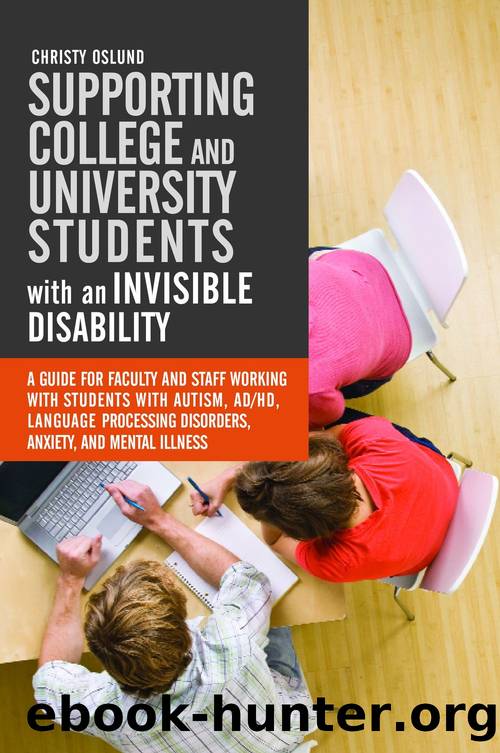Supporting College and University Students with Invisible Disabilities by Christy Oslund

Author:Christy Oslund [Christy Oslund]
Language: eng
Format: epub
ISBN: 9780857007858
Publisher: Jessica Kingsley Publishers
Published: 2013-11-12T00:00:00+00:00
CHAPTER SEVEN
Affective/Mood Disorders
These are the disorders which impact a personâs affect and mood: depression/unipolar disorder; bipolar disorder; the âmilderâ form of bipolar disorder, cyclothymia2; and schizophrenia. All these disorders are found amongst students, faculty, and staff on university campuses. These are also the disorders which arguably still have the greatest social stigma attached to them, a point that will be discussed later in this chapter.
Diagnostic classifications of mood disorders go on for many pages. At this point we will review just a handful of the most common mood disorders, providing an overview of what sets mood disorders apart from what most people will experience as part of an ordinary range of moods, i.e. âfeeling blueâ or âhaving a really bad day.â These feelings, as well as being excited or irritated, are moods we all experience; remember, something becomes a disorder by exceeding normal feelings in duration and intensity. Everyone has a bad dayânot everyone will struggle to get up and get dressed for weeks on end due to depression.
According to the National Institute of Mental Health (NIMH), major depression interferes with âa personâs ability to work, sleep, study, eat, and enjoy once-pleasurable activities. Major depression is disabling and prevents a person from functioning normallyâ (NIMH 2011). A person may experience depression for shorter periods of time such as several weeks, or depression can last for months; obviously either will interfere with a personâs ability to maintain routines such as studying, attending class, or working. Depression can also be reoccurring, for example, a person may find that they are suffering a clinical level of depression several times a year.
Bipolar disorderâsometimes called manic depressionâis a cycle of manic [hyperactive/excitable] and depressive episodes [despondent to the point of suicidal]. There are different types of bipolar disorder (diagnostic criteria look at differences in duration and frequency of manic and depressive episodes); what the different types of bipolar disorder have in common is this switching between mania and depression. As the NIMH pamphlet Bipolar Disorder explains, these changes in mood are accompanied by changes in behavior.
Behavioral changes during a manic episode include:
Talking very fast, jumping from one idea to another, having racing thoughts, being easily distracted, increasing goal-directed activities such as taking on new projects, being restless, sleeping little, having an unrealistic belief in oneâs abilities, behaving impulsively and taking part in a lot of pleasurable, high-risk behaviors such as spending sprees, impulsive sex, and impulsive business investments. (NIMH 2008)
Behavioral changes during a depressive episode include:
Feeling tired or slowed down; having problems concentrating, remembering, and making decisions; being restless or irritable; changing eating, sleeping, or other habits; thinking of death or suicide or attempting suicide. (NIMH 2008, p.2).
The length and frequency of episodes varies amongst individuals and some people will experience longer periods of moderate mood between episodes of either mania or depression. Others experience what is termed ârapid cyclingâ and as the name implies, move more frequently between extremes. As the pamphlet Bipolar Disorder points out, âSome people experience more than one episode in a week, or even within one dayâ (NIMH 2008, p.
Download
This site does not store any files on its server. We only index and link to content provided by other sites. Please contact the content providers to delete copyright contents if any and email us, we'll remove relevant links or contents immediately.
| Allergies | Asthma |
| Autism & Asperger's Syndrome | Cystic Fibrosis |
| Down Syndrome | Eating Disorders |
| Epilepsy | Learning Disorders |
| Lice | Special Needs Children |
I Capture the Castle by Dodie Smith(1875)
Aspergirls by Rudy Simone(1568)
Be Different by John Elder Robison(1538)
Autism's False Prophets by Paul A. Offit(1434)
My Child's Different by Elaine Halligan(1419)
Smart but Scattered—and Stalled by Richard Guare(1393)
101 Tips for the Parents of Boys with Autism by Ken Siri(1358)
What's Making Our Children Sick? by Michelle Perro(1339)
Asperger Syndrome (Autism Spectrum Disorder) and Long-Term Relationships by Ashley Stanford(1306)
ADHD by Mark Selikowitz(1292)
Girlish by Lara Lillibridge(1274)
An Adult with an Autism Diagnosis by Gillan Drew(1255)
Nerdy, Shy, and Socially Inappropriate by Cynthia Kim(1255)
On Immunity: An Inoculation by Biss Eula(1231)
Animal-assisted Interventions for Individuals with Autism by Temple Grandin(1210)
Sarah's Child (Hqn Romance) by Linda Howard(1204)
Seeing Ezra by Kerry Cohen(1184)
Why Gender Matters by Leonard Sax M.D. Ph.D(1161)
Overcoming ADHD by Stanley I. Greenspan & Jacob (con) Greenspan(1157)
